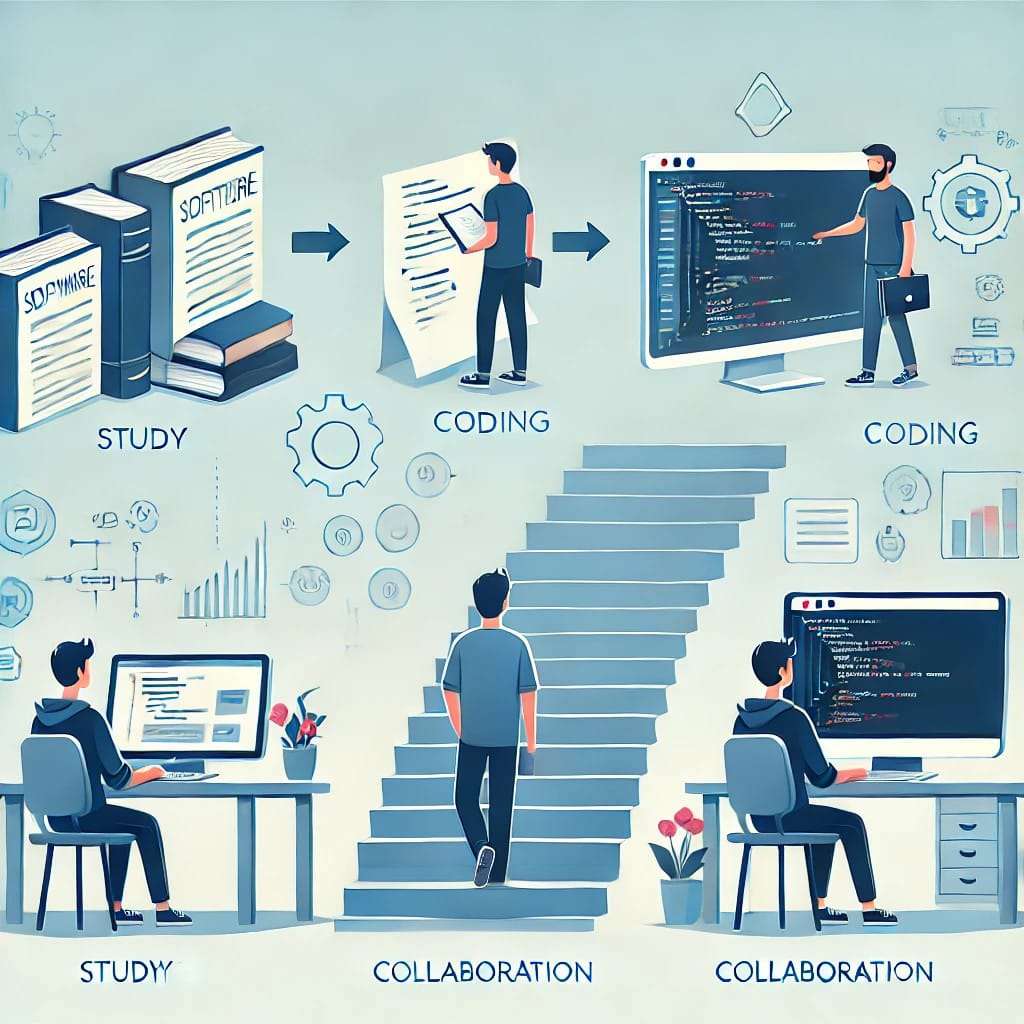KNOW HOW TO BECOME A SOFTWARE ENGINEER.

Win Rs500, What is Sprintolo?
With learning how to become a software engineer? Also, learn about our platform. Sprintolo is a contest-based website where you can earn cash prizes by participating in different contests.
How to become a software engineer? Winning a seat at the top table of tech companies as a Software Development Engineer (SDE) is not just coding but rather great competition and eagerness to hunt people who aren’t just aware of programming but also have good problem-solving abilities, in-depth core computer science principles knowledge, and being a team player. These are some key areas you need to master for this opportunity.
Always Carry Your Resume In This Type Of File:-

1. Expertise in Programming Language
There is a need to be fluent in at least one programming language. Although there are many languages, most tech companies often prefer candidates who have C++, Java, Python, or JavaScript as their special areas of expertise. Each language is distinguished by something unique:
- C++ – High performance with accurate control of memory, so it is highly favoured in system-level programming.
- Java – Widely applied in enterprise applications because of its portability and scalability.
- Python: Known for ease of use and libraries that are very big, especially in AI and machine learning.
- JavaScript: The lingua franca of front-end development but also on the rise with Node.js in full-stack engineering.
Besides syntax mastery, remember to have a strong conceptual understanding of Object-Oriented Programming (OOP), such as inheritance, polymorphism, encapsulation, and abstraction since these are often targeted during an interview.
You can visit and get to know about various job openings, and read more.
2. Data Structures and Algorithms
Interviews related to SDE should have quite a good understanding of data structures and algorithms. Major areas are as follows:
- Data Structures: Arrays, Linked Lists, Stacks, Queues, Hash Maps, Trees, Graphs, Heaps
- Algorithms: Sorting (for instance Quick Sort, Merge Sort); searching; recursion; backtracking; dynamic programming; divide and conquer; graph traversal (BFS, DFS).
Knowing about time and space complexity (Big O notation) will help you evaluate how efficient your code is a skill that cuts across technical interviews.
3. System Design and Architecture
When you work at a more senior level, especially in the context of becoming a Senior SDE, system design is given a lot more importance. You are going to have systems where scalability and efficiency become a stringent necessity. Systems would need both low-level design, such as class design, and high-level architecture, such as distributed systems. Key concepts include:
- Design Patterns: Singleton, Factory, Observer, etc.
- Scalability: Load balancer, caching, database sharding, redundancy
Microservices: Standalone services that help to make it easier to deploy or maintain
Distributed Systems: One should know very well about the CAP theorem (Consistency, Availability, and Partition tolerance) to build large systems.
Know how to become a software engineer?
4. Databases: SQL and NoSQL
You must be proficient in working with SQL and NoSQL databases. You must understand how to write efficient SQL queries, handle transactions, perform joins, and optimize indexes. Modern applications often require NoSQL databases (like MongoDB or Redis) to handle unstructured data or for horizontal scaling.
5. Version Control with Git
A software engineer needs to be familiar with Git knowledge. Therefore, you should be comfortable using it to branch, merge, resolve conflicts, and submit pull requests. Nowadays, teamwork requires effective use of version control when codebases are being collaborated on.
6. Operating Systems and Networking Concepts
A good understanding of operating systems and networking fundamentals is a must. The breadth of knowledge about multithreading, process management, memory management, and concurrency underlines the overall design of good backend systems. Networking protocols such as TCP/IP, HTTP/HTTPS, and restful services need to be well understood while developing and debugging distributed applications.
7. Testing and Debugging
This is a very good answer to how to become a software engineer. Good code is very close to well-tested code. You know how to write unit tests with JUnit (Java) or pytest (Python). Applying Test-Driven Development (TDD) ensures that, even before you write the code, your implementation meets requirements from the outset. Good debugging techniques allow you to debug problems promptly.
8. Soft Skills: Communication and Teamwork
Besides technical skills, companies value engineers who have great soft skills. Communication skills enable an engineer to elaborate on technical ideas to colleagues or managers or other non-technical audiences. Teamwork is the backbone of software development because most projects consist of several developers, designers, and product managers that require collaboration. You must be able to perform well in a teaming environment, contributing to the project’s all-inclusive success.
9. Leetcode, Codeforces, and Hackerrank
Learn how to become a software engineer only on Sprintolo. Tools like Leetcode, Codeforces, and Hackerrank are really useful in getting practice. You keep sharpening your problem-solving ability and confidence to solve algorithmic challenges which are highly frequently encountered in coding interviews of SDE positions.
10. Additional Tools and Technologies
Experience with cloud platforms, such as *AWS, **Azure, or **Google Cloud, will be quite helpful: Most of the new applications are deployed in the cloud. You will need to gain a basic understanding of *CI/CD pipelines like Jenkins, Travis CI, and containerization tools like Docker and Kubernetes, and they are going to be crucial to building, testing, and deploying software in distributed environments.
11. Interview Preparation
You must not forget to practice mock coding interviews. Resources like Pramp or InterviewBit give peer-to-peer coding interview simulations that can really be of big help to hone your skills. Also get ready for behavioural interviews by practising responses to the most common HR questions using the STAR method (Situation, Task, Action, Result) to structure your answer in a very clear and concise way.
Recommended Books
- Gayle Laakmann McDowell. – Cormen, Leiserson, Rivest, and Stein (CLRS). Introduction to Algorithms.
- Websites: Leetcode, GeeksforGeeks, InterviewBit, Codeforces.
- Videos: Harvard’s CS50, TechLead, CodeKarle.
These topics are your ticket into SDE at tech giants. Good luck!
